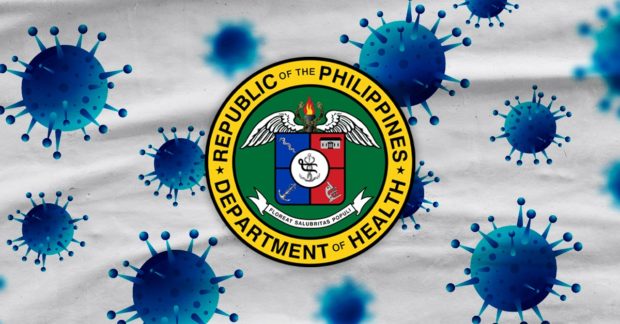13,177 new cases: 2nd highest daily COVID count

Logo of the Department of Health over a graphic representation of the SARS-COV 2, which causes coronavirus disease
The Department of Health (DOH) on Friday said it recorded 13,177 new COVID-19 infections, the second highest daily tally since the pandemic began in 2020.
The country logged its most infectious day on April 2 this year, with 15,310 cases.
The country’s total case count is now at 1,713,302, with active cases at 96,395 in the latest case bulletin of the DOH.
Majority, or 95.8 percent of the active cases are mild, 1 percent are asymptomatic, 0.97 percent are moderate, 0.8 percent are critical and 1.4 percent are severe.
The positivity rate in the country also continues to climb, with 23.6 percent of all those who were tested turning out to be positive of the disease.
According to the World Health Organization, the positivity rate must be 5 percent or below to indicate controlled transmission of the virus.
In the same case bulletin, the DOH said another 4,322 individuals have recovered from the respiratory disease, which brought the total number of recoveries to 1,587,069.
However, another 299 have also died, bringing the total fatalities to 29,838.
At her press briefing on Friday, Health Undersecretary Maria Rosario Vergeire said there could be “a possible increase” in fatalities in the coming weeks.
Health authorities also cited fatalities among vaccinees, even as they emphasized the low number of infections in this group.
In the same online briefing, Food and Drug Administration (FDA) Director General Enrique Domingo said that as of Aug. 1, only 0.0013 percent, or 116 out of 9.1 million fully vaccinated individuals, still contracted COVID-19.
“We have observed the most breakthrough infections from the Sinovac and AstraZeneca vaccinees since these are the two brands that we have the most of,” he said.
But he also emphasized that the public should not rush to the conclusion that one vaccine brand was less effective than others. He said the numbers must be appreciated in the right context.
Deaths, infections
Out of the 9.1 million fully vaccinated individuals, FDA data showed that 5.09 million received the CoronaVac vaccine of Sinovac Biotech, while 908,113 got AstraZeneca.
Of the 116 individuals who contracted COVID-19 after being fully inoculated, 91 received Sinovac, 24 received AstraZeneca and one received Pfizer.
Majority, or 88 percent, had only mild or asymptomatic forms of the respiratory disease, while 11 percent were hospitalized, Domingo said.
But an elderly male, died of COVID-19 some two weeks after contracting the disease despite being fully vaccinated with Sinovac, Domingo said.He said 51 others contracted COVID-19 within two weeks after their second dose. Of these, 13 were inoculated with AstraZeneca and 38 with Sinovac, of whom two have died.
Efficacy
Another 546 partially vaccinated individuals also contracted the respiratory disease, Domingo said. Of these, 266 received Sinovac, 255 received AstraZeneca, six received Sputnik V, 18 received Pfizer and one received Moderna.
There were 61 deaths among those who have been partially vaccinated, he noted further.
In China, researchers have found that the efficacy of a second dose of Sinovac vaccine declined, after about six months, below a key threshold which they have set.
The researchers reported the findings from a study of blood samples among healthy adults between 18 and 59 years old, who were subsequently administered a third dose of the vaccine.
Last week the Chilean government released data which also showed a decline in CoronaVac’s effectiveness, prompting the inoculation of booster shots among the elderly beginning on Wednesday.
Booster dose
In the United States, the Food and Drug Administration on Thursday authorized a booster dose of COVID-19 vaccines from Pfizer and Moderna for people with compromised immune systems.
The US health regulator amended the emergency use authorizations for the vaccines to allow an additional dose in certain individuals, specifically for recipients of solid organ transplant or those diagnosed with conditions that are considered to have an equivalent level of immunocompromise.
A few other countries, such as Israel and Germany, plan to or have already administered the third shot to avoid another crisis due to the contagious Delta variant of the coronavirus.
Pfizer has said the efficacy of the vaccine it developed with BioNTech drops over time, citing a study that showed 84-percent effectiveness from a peak of 96 percent four months after a second dose.
Moderna has also said it sees the eventual need for booster doses, especially since the Delta variant has caused “breakthrough” infections in fully vaccinated people.
Scientists divided
Scientists are still divided over the broad use of vaccine boosters among those without underlying problems as benefits of the boosters remain undetermined.
But reports of infections among vaccinated people and concerns about diminishing protection have galvanized wealthy nations to distribute booster shots, even as many countries struggle to access first vaccine doses.
The World Health Organization last week called for a moratorium on booster shots until at least the end of September. —WITH REPORTS FROM REUTERS
For more news about the novel coronavirus click here.
What you need to know about Coronavirus.
For more information on COVID-19, call the DOH Hotline: (02) 86517800 local 1149/1150.
The Inquirer Foundation supports our healthcare frontliners and is still accepting cash donations to be deposited at Banco de Oro (BDO) current account #007960018860 or donate through PayMaya using this link.